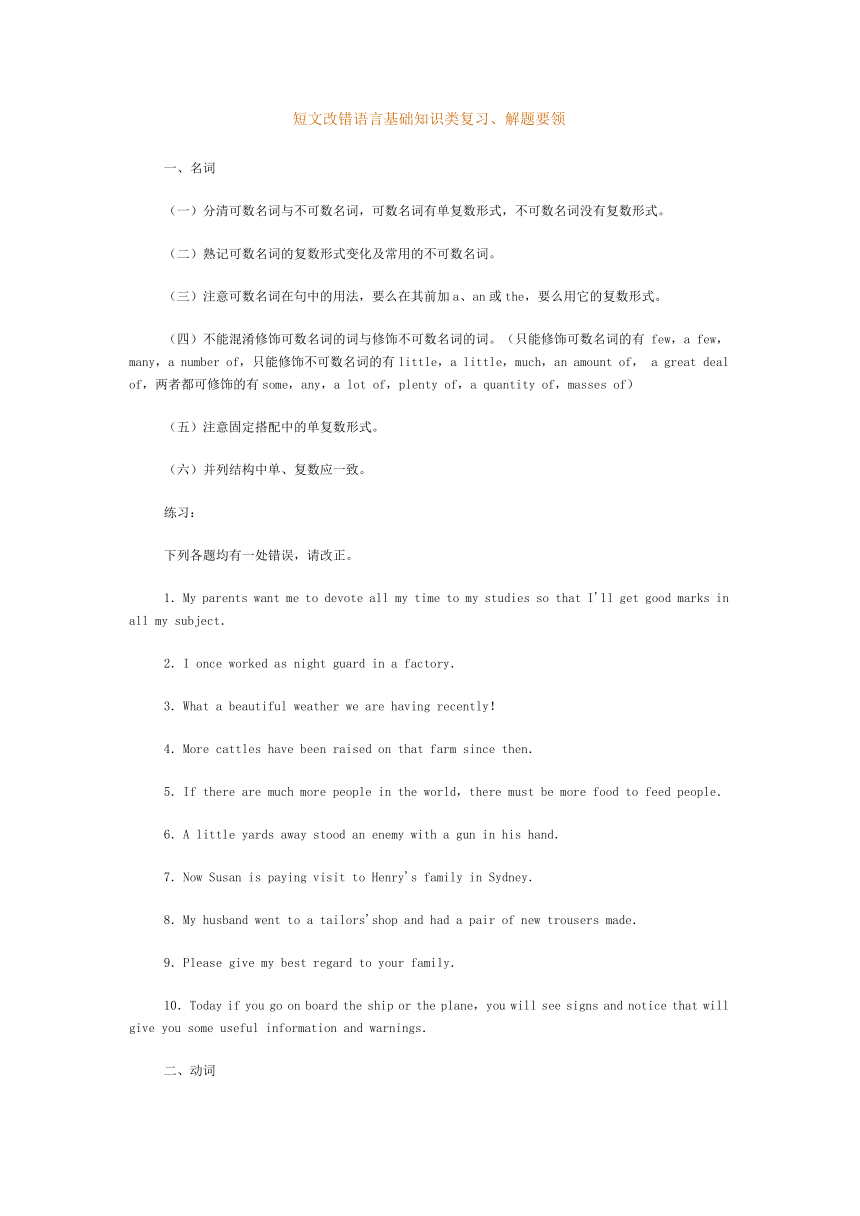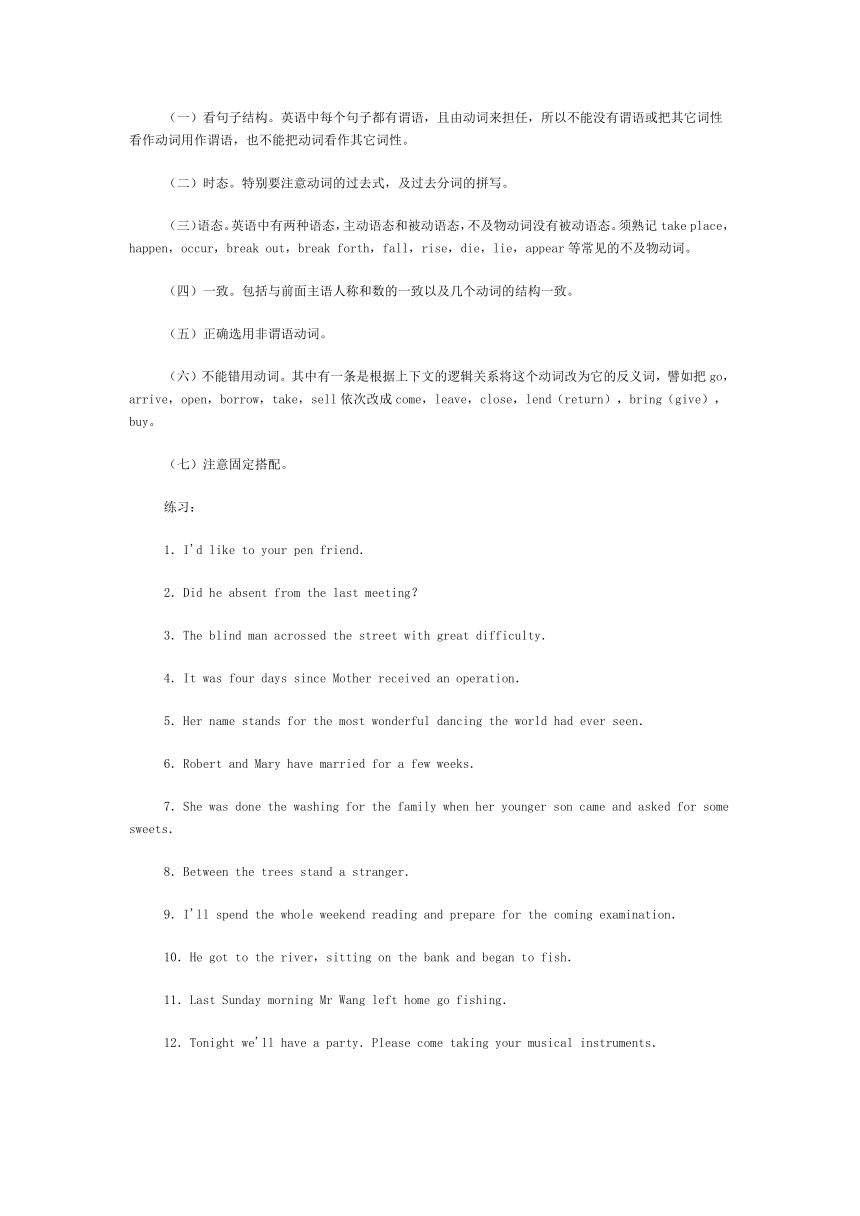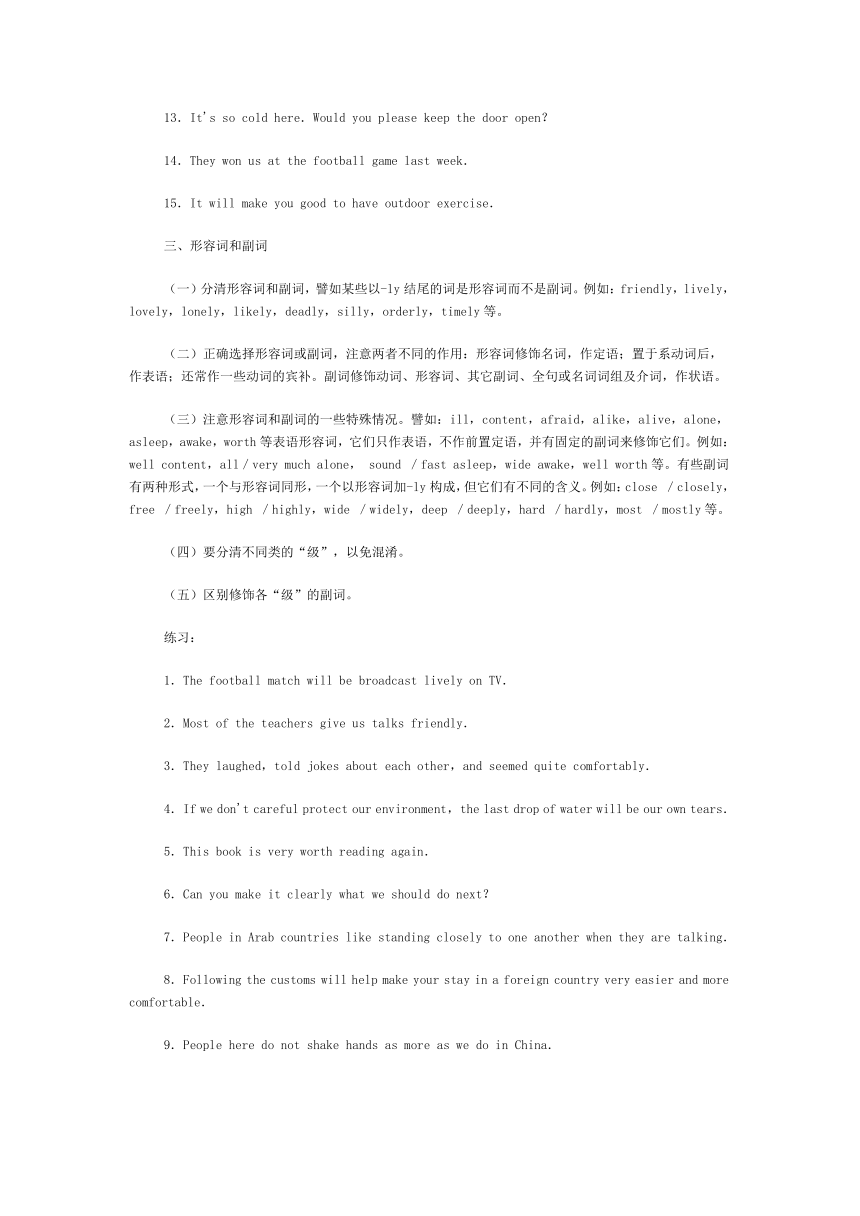短文改错语言基础知识类复习、解题要领[上学期]
文档属性
| 名称 | 短文改错语言基础知识类复习、解题要领[上学期] |

|
|
| 格式 | rar | ||
| 文件大小 | 9.1KB | ||
| 资源类型 | 教案 | ||
| 版本资源 | 通用版 | ||
| 科目 | 英语 | ||
| 更新时间 | 2007-02-04 21:56:00 | ||
图片预览



文档简介
短文改错语言基础知识类复习、解题要领
一、名词 (一)分清可数名词与不可数名词,可数名词有单复数形式,不可数名词没有复数形式。 (二)熟记可数名词的复数形式变化及常用的不可数名词。 (三)注意可数名词在句中的用法,要么在其前加a、an或the,要么用它的复数形式。 (四)不能混淆修饰可数名词的词与修饰不可数名词的词。(只能修饰可数名词的有 few,a few,many,a number of,只能修饰不可数名词的有little,a little,much,an amount of, a great deal of,两者都可修饰的有some,any,a lot of,plenty of,a quantity of,masses of) (五)注意固定搭配中的单复数形式。 (六)并列结构中单、复数应一致。 练习: 下列各题均有一处错误,请改正。 1.My parents want me to devote all my time to my studies so that I'll get good marks in all my subject. 2.I once worked as night guard in a factory. 3.What a beautiful weather we are having recently! 4.More cattles have been raised on that farm since then. 5.If there are much more people in the world,there must be more food to feed people. 6.A little yards away stood an enemy with a gun in his hand. 7.Now Susan is paying visit to Henry's family in Sydney. 8.My husband went to a tailors'shop and had a pair of new trousers made. 9.Please give my best regard to your family. 10.Today if you go on board the ship or the plane,you will see signs and notice that will give you some useful information and warnings. 二、动词 (一)看句子结构。英语中每个句子都有谓语,且由动词来担任,所以不能没有谓语或把其它词性看作动词用作谓语,也不能把动词看作其它词性。 (二)时态。特别要注意动词的过去式,及过去分词的拼写。 (三)语态。英语中有两种语态,主动语态和被动语态,不及物动词没有被动语态。须熟记take place,happen,occur,break out,break forth,fall,rise,die,lie,appear等常见的不及物动词。 (四)一致。包括与前面主语人称和数的一致以及几个动词的结构一致。 (五)正确选用非谓语动词。 (六)不能错用动词。其中有一条是根据上下文的逻辑关系将这个动词改为它的反义词,譬如把go,arrive,open,borrow,take,sell依次改成come,leave,close,lend(return),bring(give),buy。 (七)注意固定搭配。 练习: 1.I'd like to your pen friend. 2.Did he absent from the last meeting? 3.The blind man acrossed the street with great difficulty. 4.It was four days since Mother received an operation. 5.Her name stands for the most wonderful dancing the world had ever seen. 6.Robert and Mary have married for a few weeks. 7.She was done the washing for the family when her younger son came and asked for some sweets. 8.Between the trees stand a stranger. 9.I'll spend the whole weekend reading and prepare for the coming examination. 10.He got to the river,sitting on the bank and began to fish. 11.Last Sunday morning Mr Wang left home go fishing. 12.Tonight we'll have a party.Please come taking your musical instruments. 13.It's so cold here.Would you please keep the door open? 14.They won us at the football game last week. 15.It will make you good to have outdoor exercise. 三、形容词和副词 (一)分清形容词和副词,譬如某些以-ly结尾的词是形容词而不是副词。例如:friendly,lively,lovely,lonely,likely,deadly,silly,orderly,timely等。 (二)正确选择形容词或副词,注意两者不同的作用:形容词修饰名词,作定语;置于系动词后,作表语;还常作一些动词的宾补。副词修饰动词、形容词、其它副词、全句或名词词组及介词,作状语。 (三)注意形容词和副词的一些特殊情况。譬如:ill,content,afraid,alike,alive,alone, asleep,awake,worth等表语形容词,它们只作表语,不作前置定语,并有固定的副词来修饰它们。例如:well content,all/very much alone, sound /fast asleep,wide awake,well worth等。有些副词有两种形式,一个与形容词同形,一个以形容词加-ly构成,但它们有不同的含义。例如:close /closely,free /freely,high /highly,wide /widely,deep /deeply,hard /hardly,most /mostly等。 (四)要分清不同类的“级”,以免混淆。 (五)区别修饰各“级”的副词。 练习: 1.The football match will be broadcast lively on TV. 2.Most of the teachers give us talks friendly. 3.They laughed,told jokes about each other,and seemed quite comfortably. 4.If we don't careful protect our environment,the last drop of water will be our own tears. 5.This book is very worth reading again. 6.Can you make it clearly what we should do next? 7.People in Arab countries like standing closely to one another when they are talking. 8.Following the customs will help make your stay in a foreign country very easier and more comfortable. 9.People here do not shake hands as more as we do in China. 10.Dolphins are very much clever animals as is known to us all. 四、代词 (一)人称代词应注意:(1)不能错用格;(2)上下文单复数一致;(3)上下文阴阳性一致。 (二)指示代词应注意:(1)this,that表示单数;these,those表示复数;(2)this,that可作副词用,意思相当于so;(3)such,same多用于固定结构,例如:such...as /that,the same...as /that。 (三)关系代词不能跟关系副词混在一起。 (四)熟记常用的不定代词,如one,all, both,either,neither,each,many,much,little, few,other,another,something,anything,noth- ing等。并注意以下几点:(1)这些词本身不同的词义;(2)若在定语从句中作先行词,关系代词应用that;(3)something,anything,nothing 常看作单数,代词用it,修饰它们的形容词应后置。 练习: 1.His book is quite different from me. 2.The Dead Sea is really a large lake.It's surface has an area of over one thousand square kilometers. 3.In order to make themselves look short-necked and big-waisted,they have to wrap many trips of cloth around her bodies. 4.Little children believe that Father Christmas comes down from the North Pole to leave presents to him. 5.If you like this books,you can take them away. 6.The mistakes made by the Chinese students are quite different from that made by the Japanese students. 7.Her heart was set on being a great dancer,and she never cared for nothing else. 8.Suddenly the letters started arriving—the other of them came today. 9.He received many gifts,that he placed around the Christmas trees. 10.They are trying to find a house that they can live. 五、数词 (一)注意hundred,thousand,million,billion,dozen,score等词表示确切数和不确切数时的用法。 (二)表示哪个世纪,哪个年代以及某人几十几岁时的表达方式。 (三)在与基数词构成的复合形容词中,名词用单数。 (四)序数词、分数及百分数的正确表示。 (五)熟记forty,fifty和ninth,twelfth等容易发生拼写错误的基数词和序数词。 练习: 1.There are two scores of soldiers drilling on the playground. 2.In the 1980s,when he was already in the forties,he began to learn English. 3.My neighbor is an eighty-years-old woman. 4.He still wants to take part in the college entrance examination, though he is over seventies. 5.Two-nineth of students in our class are from the north. 6.I have told him hundred of times. 7.More than 90percent work was finished in time. 8.There are fourty boys and ten girls in our class. 六、连词 连词分从属连词和并列连词,答题时需注意: (一)根据全文逻辑发展顺序正确选择并列连词或从属连词。 (二)从属连词如because与so,though / although与but,if与and /or等不能同时使用。 (三)正确使用并列连词and,or,but和 for。 练习: 1.Unless he said he wasn't hungry,he ate the big breakfast. 2.Tom didn't see the film,and John did. 3.He had little to eat and a large house to live in. 4.You willnot failunless you work harder. 5.He had no sooner arrived when he fell ill. 6.We all felt if we were going to fly. 7.If you go straight along this street,and you will soon see the cinema. 8.Because he had left his key in the room, so he had to use the ladder. 七、介词 (一)英语中的介词多为固定搭配,须熟记。特别是要熟记形容词短语、动词短语和介词短语中的介词。 (二)有关介词的改错题经常以多用介词或少用介词的形式出现。
练习:1.The tailor is very proud for his son's success. 2.The bottle is full with unknown liquid. 3.Please get me a ticket of tomorrow's football match. 4.The soldiers had no mercy to the war prisoners. 5.For the sake of health,we should take care our water resources and environment. 6.On one morning,he went to a certain library to read some books. 7.The children are playing under the sun. 8.There are strange similarities in the life of John Kennedy and the life of Abraham Lincoln. 八、冠词 (一)a,an,the在单数可数名词前的用法。 (二)熟记用或不用冠词的一些特殊情况。 练习: 1.The driver brought the car to stop.In this way,he avoided an accident. 2.When the wind is blowing at 120 kilometers a hour,most waves will be twelve meters high or less. 3.When sun was setting,he still didn't catch any fish. 4.As he was busy at the work,his wife asked three men to remove all their things. 浙江绍兴鲁迅中学 刘珍琴
一、名词 (一)分清可数名词与不可数名词,可数名词有单复数形式,不可数名词没有复数形式。 (二)熟记可数名词的复数形式变化及常用的不可数名词。 (三)注意可数名词在句中的用法,要么在其前加a、an或the,要么用它的复数形式。 (四)不能混淆修饰可数名词的词与修饰不可数名词的词。(只能修饰可数名词的有 few,a few,many,a number of,只能修饰不可数名词的有little,a little,much,an amount of, a great deal of,两者都可修饰的有some,any,a lot of,plenty of,a quantity of,masses of) (五)注意固定搭配中的单复数形式。 (六)并列结构中单、复数应一致。 练习: 下列各题均有一处错误,请改正。 1.My parents want me to devote all my time to my studies so that I'll get good marks in all my subject. 2.I once worked as night guard in a factory. 3.What a beautiful weather we are having recently! 4.More cattles have been raised on that farm since then. 5.If there are much more people in the world,there must be more food to feed people. 6.A little yards away stood an enemy with a gun in his hand. 7.Now Susan is paying visit to Henry's family in Sydney. 8.My husband went to a tailors'shop and had a pair of new trousers made. 9.Please give my best regard to your family. 10.Today if you go on board the ship or the plane,you will see signs and notice that will give you some useful information and warnings. 二、动词 (一)看句子结构。英语中每个句子都有谓语,且由动词来担任,所以不能没有谓语或把其它词性看作动词用作谓语,也不能把动词看作其它词性。 (二)时态。特别要注意动词的过去式,及过去分词的拼写。 (三)语态。英语中有两种语态,主动语态和被动语态,不及物动词没有被动语态。须熟记take place,happen,occur,break out,break forth,fall,rise,die,lie,appear等常见的不及物动词。 (四)一致。包括与前面主语人称和数的一致以及几个动词的结构一致。 (五)正确选用非谓语动词。 (六)不能错用动词。其中有一条是根据上下文的逻辑关系将这个动词改为它的反义词,譬如把go,arrive,open,borrow,take,sell依次改成come,leave,close,lend(return),bring(give),buy。 (七)注意固定搭配。 练习: 1.I'd like to your pen friend. 2.Did he absent from the last meeting? 3.The blind man acrossed the street with great difficulty. 4.It was four days since Mother received an operation. 5.Her name stands for the most wonderful dancing the world had ever seen. 6.Robert and Mary have married for a few weeks. 7.She was done the washing for the family when her younger son came and asked for some sweets. 8.Between the trees stand a stranger. 9.I'll spend the whole weekend reading and prepare for the coming examination. 10.He got to the river,sitting on the bank and began to fish. 11.Last Sunday morning Mr Wang left home go fishing. 12.Tonight we'll have a party.Please come taking your musical instruments. 13.It's so cold here.Would you please keep the door open? 14.They won us at the football game last week. 15.It will make you good to have outdoor exercise. 三、形容词和副词 (一)分清形容词和副词,譬如某些以-ly结尾的词是形容词而不是副词。例如:friendly,lively,lovely,lonely,likely,deadly,silly,orderly,timely等。 (二)正确选择形容词或副词,注意两者不同的作用:形容词修饰名词,作定语;置于系动词后,作表语;还常作一些动词的宾补。副词修饰动词、形容词、其它副词、全句或名词词组及介词,作状语。 (三)注意形容词和副词的一些特殊情况。譬如:ill,content,afraid,alike,alive,alone, asleep,awake,worth等表语形容词,它们只作表语,不作前置定语,并有固定的副词来修饰它们。例如:well content,all/very much alone, sound /fast asleep,wide awake,well worth等。有些副词有两种形式,一个与形容词同形,一个以形容词加-ly构成,但它们有不同的含义。例如:close /closely,free /freely,high /highly,wide /widely,deep /deeply,hard /hardly,most /mostly等。 (四)要分清不同类的“级”,以免混淆。 (五)区别修饰各“级”的副词。 练习: 1.The football match will be broadcast lively on TV. 2.Most of the teachers give us talks friendly. 3.They laughed,told jokes about each other,and seemed quite comfortably. 4.If we don't careful protect our environment,the last drop of water will be our own tears. 5.This book is very worth reading again. 6.Can you make it clearly what we should do next? 7.People in Arab countries like standing closely to one another when they are talking. 8.Following the customs will help make your stay in a foreign country very easier and more comfortable. 9.People here do not shake hands as more as we do in China. 10.Dolphins are very much clever animals as is known to us all. 四、代词 (一)人称代词应注意:(1)不能错用格;(2)上下文单复数一致;(3)上下文阴阳性一致。 (二)指示代词应注意:(1)this,that表示单数;these,those表示复数;(2)this,that可作副词用,意思相当于so;(3)such,same多用于固定结构,例如:such...as /that,the same...as /that。 (三)关系代词不能跟关系副词混在一起。 (四)熟记常用的不定代词,如one,all, both,either,neither,each,many,much,little, few,other,another,something,anything,noth- ing等。并注意以下几点:(1)这些词本身不同的词义;(2)若在定语从句中作先行词,关系代词应用that;(3)something,anything,nothing 常看作单数,代词用it,修饰它们的形容词应后置。 练习: 1.His book is quite different from me. 2.The Dead Sea is really a large lake.It's surface has an area of over one thousand square kilometers. 3.In order to make themselves look short-necked and big-waisted,they have to wrap many trips of cloth around her bodies. 4.Little children believe that Father Christmas comes down from the North Pole to leave presents to him. 5.If you like this books,you can take them away. 6.The mistakes made by the Chinese students are quite different from that made by the Japanese students. 7.Her heart was set on being a great dancer,and she never cared for nothing else. 8.Suddenly the letters started arriving—the other of them came today. 9.He received many gifts,that he placed around the Christmas trees. 10.They are trying to find a house that they can live. 五、数词 (一)注意hundred,thousand,million,billion,dozen,score等词表示确切数和不确切数时的用法。 (二)表示哪个世纪,哪个年代以及某人几十几岁时的表达方式。 (三)在与基数词构成的复合形容词中,名词用单数。 (四)序数词、分数及百分数的正确表示。 (五)熟记forty,fifty和ninth,twelfth等容易发生拼写错误的基数词和序数词。 练习: 1.There are two scores of soldiers drilling on the playground. 2.In the 1980s,when he was already in the forties,he began to learn English. 3.My neighbor is an eighty-years-old woman. 4.He still wants to take part in the college entrance examination, though he is over seventies. 5.Two-nineth of students in our class are from the north. 6.I have told him hundred of times. 7.More than 90percent work was finished in time. 8.There are fourty boys and ten girls in our class. 六、连词 连词分从属连词和并列连词,答题时需注意: (一)根据全文逻辑发展顺序正确选择并列连词或从属连词。 (二)从属连词如because与so,though / although与but,if与and /or等不能同时使用。 (三)正确使用并列连词and,or,but和 for。 练习: 1.Unless he said he wasn't hungry,he ate the big breakfast. 2.Tom didn't see the film,and John did. 3.He had little to eat and a large house to live in. 4.You willnot failunless you work harder. 5.He had no sooner arrived when he fell ill. 6.We all felt if we were going to fly. 7.If you go straight along this street,and you will soon see the cinema. 8.Because he had left his key in the room, so he had to use the ladder. 七、介词 (一)英语中的介词多为固定搭配,须熟记。特别是要熟记形容词短语、动词短语和介词短语中的介词。 (二)有关介词的改错题经常以多用介词或少用介词的形式出现。
练习:1.The tailor is very proud for his son's success. 2.The bottle is full with unknown liquid. 3.Please get me a ticket of tomorrow's football match. 4.The soldiers had no mercy to the war prisoners. 5.For the sake of health,we should take care our water resources and environment. 6.On one morning,he went to a certain library to read some books. 7.The children are playing under the sun. 8.There are strange similarities in the life of John Kennedy and the life of Abraham Lincoln. 八、冠词 (一)a,an,the在单数可数名词前的用法。 (二)熟记用或不用冠词的一些特殊情况。 练习: 1.The driver brought the car to stop.In this way,he avoided an accident. 2.When the wind is blowing at 120 kilometers a hour,most waves will be twelve meters high or less. 3.When sun was setting,he still didn't catch any fish. 4.As he was busy at the work,his wife asked three men to remove all their things. 浙江绍兴鲁迅中学 刘珍琴
